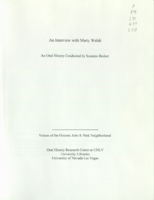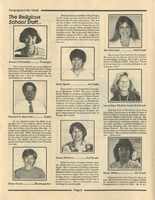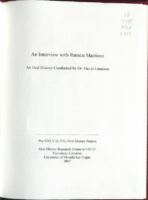Search the Special Collections and Archives Portal
Search Results

Transcript of interview with Tony Grasso by Coleen Seifert, February 29 & March 1, 1980
Date
Archival Collection
Description
On February 29, 1980, Coleen Seifert interviewed Tony Grasso (born 1926 in Brooklyn, New York) about his career in gaming. Grasso first provides details on his background and how he ended up moving to Las Vegas in 1951 before talking about his experience as a dealer in some of the early casinos. He also talks a little about the different roles and games that casino workers deal and how players are invited to visit casinos. The interview concludes with a discussion on gaming unions and Grasso’s future plans. On a date that soon followed the above date, Seifert also interviewed Doug Charles (born 1954 in Brooklyn, New York) about his career in the gaming industry. Charles also talks about his family background, his arrival to Las Vegas in 1957, and the early development of the various gaming properties in Las Vegas. He later goes into detail over some of his experiences as a dealer, his opinions on mob control over gaming, and some of the political and legal issues that have arisen in La
Text

Transcript of interview with Emma Ellsworth by Clark Ellsworth, March 5, 1980
Date
Archival Collection
Description
On March 5, 1980, Clark Ellsworth interviewed his grandmother, Emma Ellsworth (born 1902 in Payson, Utah) about her experiences in Southern Nevada. Ellsworth first talks about growing up in Utah and getting married before moving to Pioche, Nevada during the Great Depression. She also talks about bringing up a family in Las Vegas as well as her and her husband’s work in running Beneficial Life, a life insurance business, in Las Vegas. Ellsworth also talks about the Mormon churches in Las Vegas, the schools her children attended, and the number of grandchildren and great-grandchildren she had at the time.
Text

Transcript of interview with Marty Walsh by Suzanne Becker, July 19, 2007
Date
Archival Collection
Description
In 2002, Marty Walsh and her husband purchased a home in the John S. Park Neighborhood. Three aspects attracted them to their 1941-built home: the quality construction; the aesthetics and details of the house; and the "old-fashion human element" that she associated with her grandparents. Marty describes their relocation to Las Vegas after living for nine years in Ireland and her joy of discovering the John S. Park community. For her there is a neighborliness that they found in the form of the Neighborhood Watch. She feels the neighborhood still has work to do, but the gentrification has had splendid results as new "urbanites" replace original homeowners. From her artist point of view, she also provides thoughts about the impact the artist community of musicians, painters, and creative artists has had on the neighborhood. Even though she is relatively new to Las Vegas, she is well researched in the historic aspects of John S. Park location: once a fertile plot of land where
Text

Interview with Cecil C. Garland, July 19, 2006
Date
Archival Collection
Description
Text

Interview with Rosemary Lynch, June 8, 2004
Date
Archival Collection
Description
Text

Newsletter from Congregation Ner Tamid, October 1991
Date
Archival Collection
Description
Newsletter from Congregation Ner Tamid, October 1991
Text
Elaine Newton oral history interview
Identifier
Abstract
Oral history interview with Elaine Newton conducted by Cecilia Winchell, Kristel Peralta, and Vanessa Concepcion on May 19, 2021 for Reflections: The Las Vegas Asian American and Pacific Islander Oral History Project.
Elaine Newton shares her family's history living in Hawaii and Japan, and memories from her childhood growing up with her six siblings in Honolulu. She talks about becoming a flight attendant for Pan American World Airways and how she met her former husband, Wayne Newton, after a stop in Vietnam. Elaine recalls their courtship and marriage as well as what Las Vegas life, fashion, and entertainment were like during the 1980s. She also speaks about racial discrimination and anti-asian violence in the past and present.
Archival Collection

Transcript of interview with Ramon Martinez by Dr. David Emerson, April 24, 2006
Date
Archival Collection
Description
Text

Transcript of interview with LaVerne Ligon, BJ Thomas, and Leonard Polk conducted by Claytee D. White, July 9, and July 18, 2012
Date
Archival Collection
Description
LaVerne Ligon was born in 1942 in Washington D.C. Around the age of nine, she started dancing at the Jones-Haywood School of Ballet, which started her career in dance. She took her first job as a professional dancer when she was eighteen with the Capitol Ballet Company. She moved to Las Vegas, Nevada in 1973. In 1974, she successfully auditioned for a touring cast of Hello, Dolly! After completing that show, Ligon performed in a number of productions in Las Vegas, including Hallelujah Hollywood and Jubilee. She retired from dancing in the early 1980s after sustaining an injury and she opened the Simba Talent Agency, a dance school for at-risk youth. She also worked for Family Services, but is now retired. She continues to work on projects with the Simba Talent Agency. BJ Thomas was born in 1935 in Plain Dealing, Louisiana. He moved to Las Vegas in 1968 after working for the Post Office in San Francisco. He worked a number of jobs for two years before beginning to pursue work as a stage hand. Thomas worked for shows at the Tropicana and Caesars Palace. He is currently retired. Leonard Polk Jr. was born in 1948 in Monroe, Louisiana. He and his mother moved to Las Vegas in 1949 when he was just two months old. His father worked on the Hoover Dam. Polk grew up in West Las Vegas and remembers the movement to integrate the schools in the city. As a young adult, he joined the Marines and served a tour of duty in Vietnam. Polk began to work for shows in Las Vegas after he finished his military career. He worked for the Aladdin Baghdad Theater and for the MGM Grand Hotel. He is currently retired, but remains active with the First African Methodist Episcopal Church.
Text

Transcript of interview with Gladys Neville by JoAnn Bingham, June 2, 2004
Date
Description
Text
